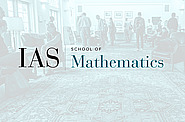Seminars Sorted by Series
Computer Science/Discrete Mathematics Seminar I
Sep
22
2008
Computer Science/Discrete Mathematics Seminar I
Hypergraph Ramsey Numbers
Benny Sudakov
11:15am|S-101
Sep
29
2008
Computer Science/Discrete Mathematics Seminar I
Composition of Rational Functions
Michael Zieve
11:15am|S-101
Oct
06
2008
Computer Science/Discrete Mathematics Seminar I
List-Decoding Reed-Muller Codes Over Small Fields
11:15am|S-101
Oct
13
2008
Computer Science/Discrete Mathematics Seminar I
Average Case to Worst Case Reductions for Polynomials
11:15am|S-101
Oct
20
2008
Computer Science/Discrete Mathematics Seminar I
Affine Dispersers from Subspace Polynomials
11:15am|S-101
Oct
27
2008
Computer Science/Discrete Mathematics Seminar I
<a href="http://focs2008.org">http://focs2008.org</a>
No Seminar Due to FOCS 2008 Symposium
11:15am
Nov
03
2008
Computer Science/Discrete Mathematics Seminar I
Rounded Parallel Repetitions of Unique Games
11:15am|S-101
Nov
10
2008
Nov
17
2008
Computer Science/Discrete Mathematics Seminar I
Scalably Scheduling Processes with Arbitrary Speedup Curves
Jeff Edmonds
11:15am|S-101
Nov
24
2008
Computer Science/Discrete Mathematics Seminar I
Large Induced Trees in $K_r$-Free Graphs
Jacob Fox
11:15am|S-101
Dec
01
2008
Computer Science/Discrete Mathematics Seminar I
Derandomizing Algorithms on Product Distributions
Avinatan Hassidim
11:15am|S-101
Dec
08
2008
Computer Science/Discrete Mathematics Seminar I
Convergent Sequences of Sparse Graphs
Bela Bollobas
11:15am|S-101
Dec
15
2008
Computer Science/Discrete Mathematics Seminar I
Direct-Product Testing, and a New 2-Query PCPs
11:15am|S-101
Jan
19
2009
Computer Science/Discrete Mathematics Seminar I
Noise-Resilient Group Testing: Limitations and Constructions
Mahdi Cheraghchi
11:15am|S-101
Jan
26
2009
Feb
02
2009
Computer Science/Discrete Mathematics Seminar I
Towards a Calculus for Non-Linear Spectral Gaps
11:15am|S-101
Feb
09
2009
Computer Science/Discrete Mathematics Seminar I
On P vs NP, Geometric Complexity Theory, and the Riemann Hypothesis
Ketan Mulmuley
11:15am|S-101
Feb
16
2009
Computer Science/Discrete Mathematics Seminar I
Approximating Submodular Functions Everywhere
Nick Harvey
11:15am|S-101
Feb
23
2009
Computer Science/Discrete Mathematics Seminar I
The Convergence of Bird Flocking
11:15am|West Bldg. Lecture Hall
Mar
02
2009
Computer Science/Discrete Mathematics Seminar I
Finding Sparse Cuts Locally Using Evolving Sets
Yuval Peres
11:15am|S-101
Mar
09
2009
Computer Science/Discrete Mathematics Seminar I
NP and MA Do Not Contain coNP in Multiparty Communication Complexity
Dmitry Gavinsky
11:15am|S-101
Mar
16
2009
Computer Science/Discrete Mathematics Seminar I
Simple Algorithms for Sequential k-Independent Graphs
11:15am|S-101
Mar
23
2009
Computer Science/Discrete Mathematics Seminar I
Symmetry and Approximability of Submodular Maximization Problems
11:15am|S-101
Mar
30
2009
Computer Science/Discrete Mathematics Seminar I
No Seminar Due to DIMACS "Property Testing" Workshop
11:15am
Apr
06
2009
Computer Science/Discrete Mathematics Seminar I
Public Key Cryptography from Different Assumptions
Benny Applebaum
11:15am|S-101
Apr
13
2009
Apr
20
2009
Computer Science/Discrete Mathematics Seminar I
The Constant-Depth Complexity of k-Clique
Ben Rossman
11:15am|S-101
Apr
27
2009
May
04
2009
Computer Science/Discrete Mathematics Seminar I
Lower Bounds for Randomized Communication Complexity
Mike Saks
11:15am|S-101
May
11
2009
Computer Science/Discrete Mathematics Seminar I
SDP Integrality Gaps with Local L1-Embeddability
11:15am|S-101
May
18
2009
Computer Science/Discrete Mathematics Seminar I
The Density Hales-Jewett Theorem and Open-Source Mathematics
11:15am|S-101
May
25
2009
Computer Science/Discrete Mathematics Seminar I
Institute Closed in Observance of Memorial Day
11:15am
May
26
2009
Computer Science/Discrete Mathematics Seminar I
On the Complexity of Boolean Functions in Different Characteristics
Amir Shpilka
2:00pm|S-101
Jun
01
2009
Jun
08
2009
Sep
14
2009
Computer Science/Discrete Mathematics Seminar I
Blackbox Polynomial Identity Testing for Depth 3 Circuits
11:15am|S-101
Sep
21
2009
Sep
28
2009
Computer Science/Discrete Mathematics Seminar I
No Seminar Today in Observance of Yom Kippur
11:15am
Oct
05
2009
Computer Science/Discrete Mathematics Seminar I
The Detectability Lemma and Quantum Gap Amplification
Itai Arad
11:15am|S-101
Oct
12
2009
Computer Science/Discrete Mathematics Seminar I
On The Complexity of Circuit Satisfiability
Ramamohan Paturi
11:15am|S-101
Oct
19
2009
Computer Science/Discrete Mathematics Seminar I
PCPs of Sub-Constant Error Via Derandomized Direct Product
11:15am|S-101
Oct
26
2009
Computer Science/Discrete Mathematics Seminar I
<a href="http://www.cc.gatech.edu/focs2009/">http://www.cc.gatech.edu/focs2009/</a>
No Seminar Due to FOCS 2009 Symposium
11:15am
Nov
02
2009
Computer Science/Discrete Mathematics Seminar I
Grothendieck Inequalities, XOR Games, and Communication Complexity
Troy Lee
11:15am|S-101
Nov
16
2009
Computer Science/Discrete Mathematics Seminar I
No Seminar -- Oberwolfach Meeting on Complexity Theory
11:15am
Nov
23
2009
Computer Science/Discrete Mathematics Seminar I
Privacy of Dynamic Data: Continual Observation and Pan Privacy
Moni Naor
11:15am|S-101
Nov
30
2009
Computer Science/Discrete Mathematics Seminar I
There will be no talk today due to trave times from the Thanksgiving Holiday.
11:15am
Dec
07
2009
Computer Science/Discrete Mathematics Seminar I
The NOF Communication Complexity of Multiparty Pointer Jumping
Joshua Brody
11:15am|S-101
Dec
14
2009
Computer Science/Discrete Mathematics Seminar I
A Parallel Repetition Theorem for Any Interactive Argument
Iftach Ilan Haitner
11:15am|S-101
